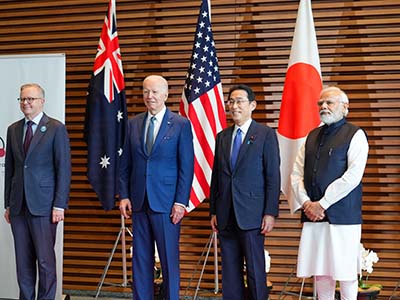Foreword: Quad Cooperation in the Indo-Pacific
Admiral Jonathan Greenert provides context for the roundtable “Quad Cooperation in the Indo-Pacific: Regional Security Challenges and Prospects for Greater Coordination” in this foreword to the collection of four essays.
The Quadrilateral Security Dialogue (commonly known as the Quad) has evolved from an ad hoc mechanism created during the response to the 2004 Indian Ocean tsunami into a key element of the United States’ Indo-Pacific Strategy. Today, the Quad is a means for the United States, Japan, Australia, and India to coordinate policy and respond to regional challenges ranging from maritime domain awareness operations and Covid-19 vaccine production to climate change and supply chains. As such, the primary instances of cooperation among Quad countries to date are nontraditional security measures and the provision of regional public goods. Nonetheless, the original security concerns that brought the members into alignment remain salient.
While the origins of the Quad countries’ concerns with China are unique to each member, their anxieties over its regional behavior and ambitions are increasingly aligned. For India, repeated confrontations with the People’s Liberation Army along the disputed Sino-Indian border, coupled with China’s growing presence and influence in the Indian Ocean region and South Asia, drive its growing alignment with the other Quad members. Japan continues to be a target of China’s gray-zone operations, particularly in the East China Sea, and is especially concerned with the implications of a potential conflict in the Taiwan Strait. Australia, despite its distance from mainland China, is concerned about China’s growing influence in the South Pacific. Further, it has endured coercive economic measures and disinformation campaigns by Beijing. The United States shares these concerns and has pursued improved alliances with Japan and Australia, as well as strengthening its partnership with India. As a result, China’s malign behavior toward these allies and partners has revitalized the Quad in recent years.
Nevertheless, frustration and impatience have emerged due to a perceived lack of coordination among Quad countries relating to China’s regional behavior and broader geopolitical issues. Although the revitalization of the Quad in 2017 took place in the wake of downward-trending dynamics in the countries’ bilateral relationships with Beijing, the Quad is yet to explicitly cite and condemn China’s actions, such as its aggressive actions in the Taiwan Strait and territorial claims in the South China Sea. Moreover, in the wake of the Russian invasion of Ukraine, the Quad was unable to collectively respond because of disagreements between India and the other three partners. While the United States, Japan, and Australia formally condemned Russia’s aggression and swiftly imposed sanctions on its economy, India abstained from UN resolutions and has continued doing business with Russia. It thus remains a task for the Quad to deepen coordination and operationalize its efforts against China and other competitors to promote shared values and strengthen stability in the Indo-Pacific.
This roundtable evaluates the Quad’s recent responses to regional security challenges, identifies opportunities for security cooperation, and explores ways to further develop the Quad. It builds on previous discussions at a private roundtable workshop convened by the National Bureau of Asian Research (NBR), which brought together security analysts from the United States, Japan, Australia, and India. The roundtable featured substantive discussions on questions of key regional importance, including how the Quad can expand on cooperation in areas of nontraditional security to address pressing challenges in the region, such as China’s increasingly assertive regional behavior and North Korea’s continued buildup of its nuclear and ballistic missile programs.
The Biden administration has proposed several options to strengthen coordination among the Quad partners in the diplomatic and security arenas, some of which have already come to fruition. For instance, Quad working groups are assessing opportunities to increase coordination and align national policies regarding critical and emerging technologies, cybersecurity, and climate change. Current exercises such as the Malabar Exercise and bilateral and trilateral security cooperation among Quad countries that enhance interoperability are important and meaningful signposts of progress. Nevertheless, more can be done to ensure that the grouping is ready to respond to regional security threats. This roundtable helps clarify the challenges faced by the Quad and considers potential options for the grouping to better coordinate to uphold regional peace and stability and advance a free and open Indo-Pacific region.
In the first essay, Alison Szalwinski examines U.S. perspectives on the future of Indo-Pacific cooperation among the Quad member countries. She argues that maritime security, North Korea, and Taiwan are prospective areas for coordination, albeit to varying degrees, given the grouping’s views on China. In the second essay, Kate Sullivan de Estrada demonstrates that India’s participation in and contributions to the Quad reflect the country’s distinct perspectives on regional security challenges and vision for the regional and global order. She argues that despite the grouping’s burgeoning alignment on the diplomatic, economic, and military tenets of the “free and open Indo-Pacific” concept, India will continue to shape the terms and limits of this convergence. Next, Mark Watson elaborates on Australia’s views on the Quad as a mechanism to advance Canberra’s commitment to multilateralism in the Indo-Pacific. He argues that the Quad currently provides a “watering can” to increase alignment among Indo-Pacific countries in responding to China’s regional assertiveness, but concludes that the continuation of China’s assertive behavior could encourage the Quad to provide a “hammer” by becoming a true security framework. In the final essay, Kei Koga assesses Japan’s roles in and perspectives on the Quad and discusses how member countries could more effectively clarify institutional divisions of labor according to their respective national strengths and comparative advantages.
Jonathan W. Greenert holds the John M. Shalikashvili Chair in National Security Studies at the National Bureau of Asian Research (NBR). In this role, he informs debates on critical issues in the Indo-Pacific through briefings to congressional members, military, media, and administration officials. Prior to joining NBR, Admiral Greenert served as the 30th Chief of Naval Operations from 2011 to 2015.



